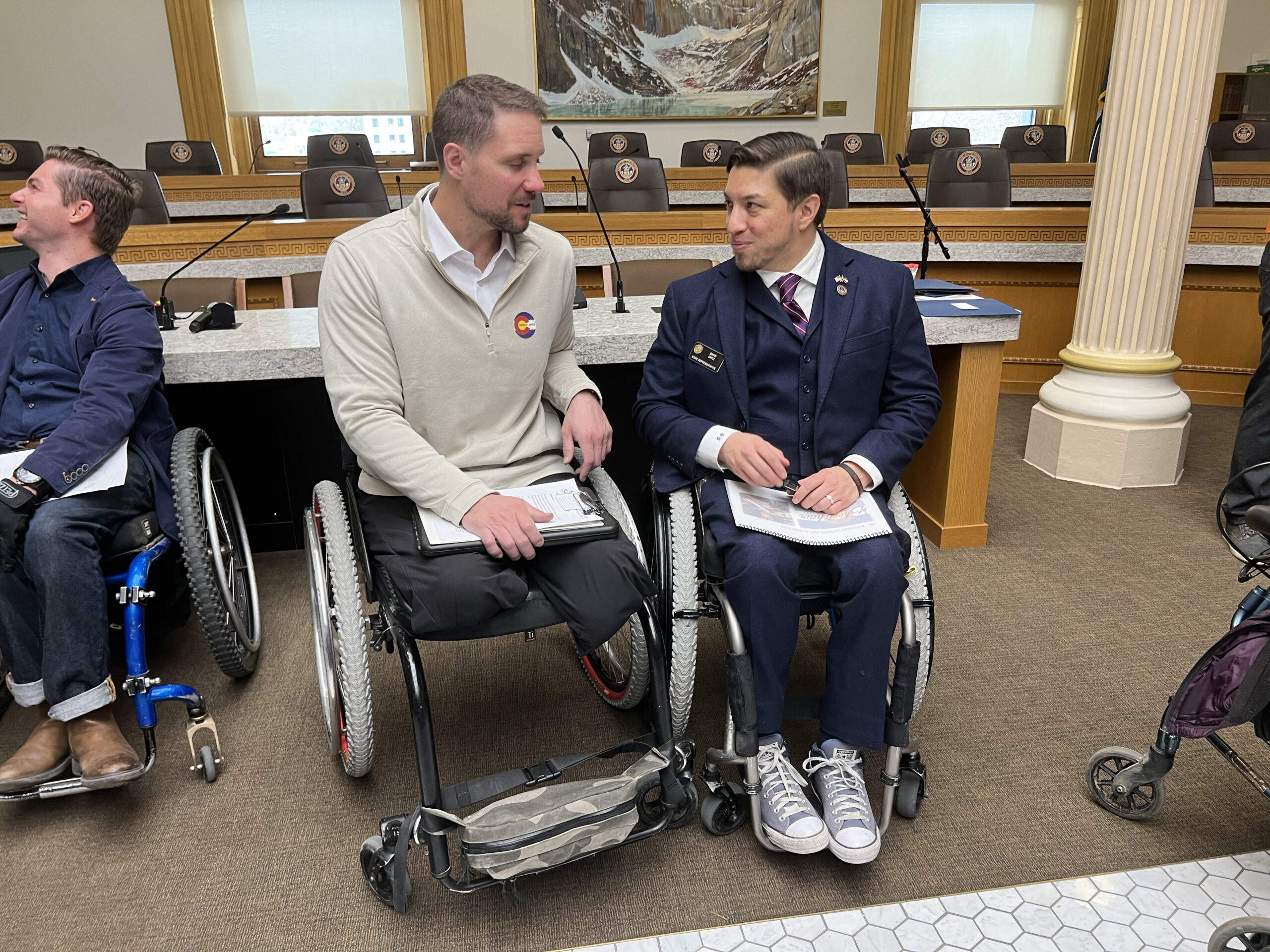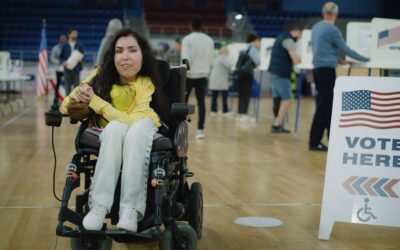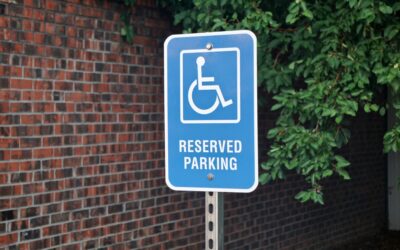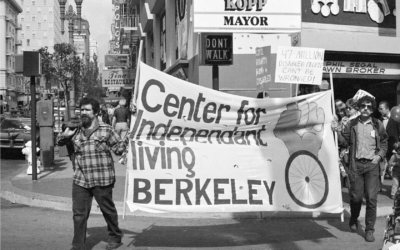A Conversation with Rep. David Ortiz
(Image: CPWD Community Organizer Craig Towler talks with Rep. David Ortiz at the Denver Capitol in March of 2023.)
Over the past two months, we’ve talked about several important independent living issues and topics. In July, we celebrated the ADA, CPWD’s 47th anniversary, and the history of the Independent Living Movement. In August, we address accommodations, at work, in public, and the role of service animals.
These rights and changes were hard-won over decades, beginning with marches and protests in the ‘60s. Today the march towards true independence, one that includes equality, accessibility, and equity, continues. As we progressively push for change, the activism of yesteryear has transformed into systems advocacy. Whereas once people with disabilities handcuffed themselves to fences and conducted sit-ins at federal buildings in order to be heard, today, we gather at the Capitol, and work with lawmakers and influencers to bring our voice and needs.
One of our champions over the past few years has been Rep. David Ortiz. Together with CPWD and other stakeholders, Rep. Ortiz has successfully sponsored bills and laws that increase equity and equality. While we are sad that he will not be running for reelection due to personal reasons, we are deeply grateful for his commitment and support. We had a chance to talk to him about his experience and views, and wanted to share some of that conversation.
Advocating for Real Change
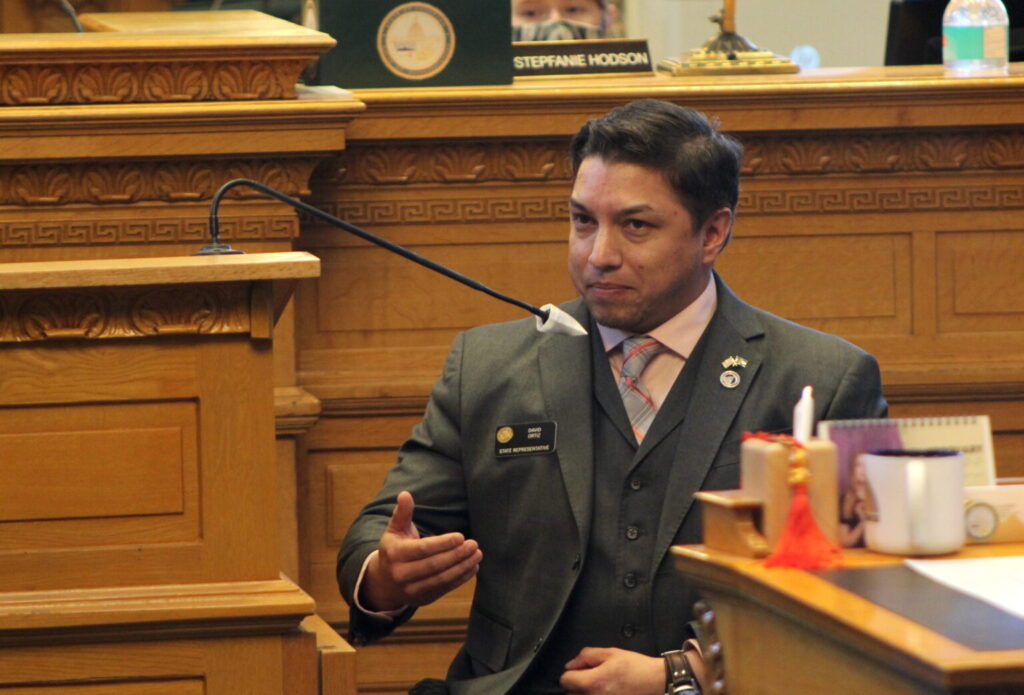
Rep. David Ortiz speaks in front of the Colorado State House of Representatives.
David Ortiz is a Veteran with a disability who uses a wheelchair. He is passionate about rights and access for people with disabilities. Ortiz was instrumental in the passing of In 2023, HB- HB23-1136, also known as the Prosthetics for Recreational Activities Bill. This bill requires insurance carriers to cover the cost of a second prosthetic device that would allow for recreational activities. Prior to this, only one prosthetic device that was deemed “medically necessary” was covered under insurance. Usually, medically necessary prosthetics were not suitable for recreation or more active movement, and could often cause secondary injury or break if used in that way. And, the cost of prosthetics for recreation was usually too high for most people with disabilities.
More recently, Ortiz sponsored a bill that would increase the number of new housing constructions that are build using Universal Design – a design philosophy that builds homes and other structures so that they are accessible to all.
“The dream would be that from the beginning, when an architect is designing a building, that basic access is built in and it’s required,” Ortiz said. “You have fire codes and other codes; why not have a basic access building code that at least provides basic access to safety and increases accessibility?”
Under the same view, Ortiz has been working towards increasing airport accessibility and airline liability for assistive equipment.
“There is a mandate for airports [DIA] to have accessible bathrooms – accessible family-style bathrooms for adults or large children with disabilities,” he explained. “They haven’t complied with that mandate. We’re talking about basic accessibility, and basic dignity. That is something that needs to be enforced and needs to happen.”
Ortiz added that every year, thousands of wheelchairs and other accessible equipment or broken or lost by airlines through the baggage handling process. That’s not acceptable, and there are not sufficient policies for replacement and provisions for immediate transportation/accommodation options. This is an area where he would like to see change happen immediately.
Even with the ADA, he shared, which is a law, many people treat it as optional. “The law has been there for 34 years and we want the equity it is meant to provide. We want to be able to enjoy the same access and opportunities that are available for able-bodied people: in the workplace, with housing, with transportation. We are tired of businesses refusing to follow this law, and how long it is taking to put in a basic foundation of accessibility in our workplaces and communities.”
Ortiz says part of the problem is enforcement, that there are not enough teeth in the law to provide strong enforcement. However, if states begin to adopt these federal standards as law, it would be a lot easier to take a business to court to enforce compliance at a state level then at the federal level.
How Change is Happening
A lot has happened in the past 5 years or so. Bills have been passed, awareness and advocacy have increased, the ideas of accessibility and equity are no longer just fuzzy philosophical words, but actual practices and requirements in many organizations and communities. Ortiz said that a large part of the successful changes has been a result of visibility. When 200 people with disabilities descend on the state Capitol for Disability Rights Advocacy Day, lawmakers and others notice. It’s a lot harder to ignore the petitions and needs of community members with disabilities when they are right in front of you.
He said social media has also played a role in increasing awareness and advocacy. But, he warns, social media should be used for changing awareness, and not for political agendas, lest petty debate take over the conversation and distract us from the real work and goals.
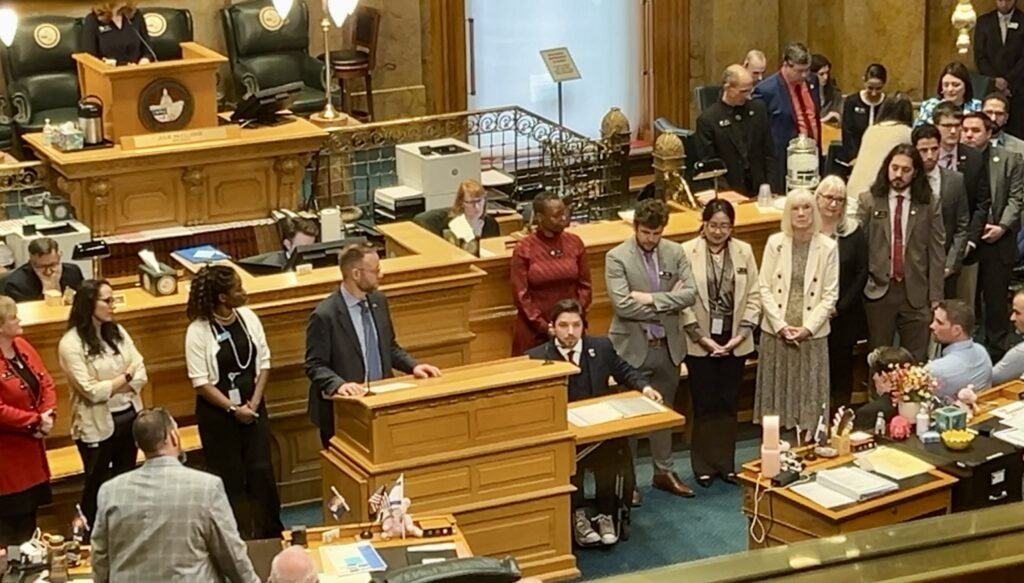
Rep. Ortiz and a group of people gather at the Colorado State Capitol for Disability Rights Advocacy Day in March, 2024.
As for the future, Ortiz said progress and improvements will happen in line with how well people with disabilities can come together as one voice.
“It depends on how much the community of people living with a disability continues to organize,” he explained. “There are various disabilities and groups – mental, physical, IDD, etc. – and many of them are working to push their key issues. If we want systemic change, we need to learn to stop working in silos and work together more – that’s what created a lot of power at Disability Rights Advocacy Day when a cross-coalition of people with disabilities changed a lot of hearts and minds. Also, some people are born with a disability and some acquire one later in life. We have a lot of political stripes and we need to get over that. We all belong to a marginalized community, like it or not. It doesn’t have to be one person’s vision – we are stronger when we work together.”
Ortiz said that while different people with disabilities have different needs in different areas of life, he would like to see laws and policies that ensure a foundation of accessibility and equity established over the next few years.
“As a baseline, I would like to see securing basic needs for those who most in need; holding airlines and other transportation providers accountable for breaking wheelchairs and other equipment; accessible housing – not just doors and bathrooms but also plain-language leases and contracts that can be easily understood by people with IDD and others; and accessible employment for anyone who wants to work.”
What Can You Do
Ortiz reminds us that creating an accessible world is not just a benefit for people with disabilities, it also provides freedom and access for aging people, parents with babies, and many others; it helps everyone. He stresses that the effort is necessary and worth it.
“I know it’s easy to become cynical; easier to sit at home than to get engaged,” he reflected. “This takes hard work; it takes sacrifice. But not only are you going to help others who are like you, you are going to make friends and find purpose. Advocacy and effort will pull you out of cynicism and depression, and you will start to see beneficial changes in your life and in society. There will be setback and disappointments, but there will also be big rewards.”
Ortiz wants to see a community that is engaged, and has a place at the policy table. “Start showing up and start supporting important causes,” he proclaimed. “For those without disabilities, don’t just be an ‘able-bodied savior,’ put people with disabilities in positions of leadership, and get them involved in policy and decision making. For those of us with disabilities, don’t let cynicism and disappointment knock you down. You have the skills and abilities to make a difference. And you’re not just helping yourself when you do; you’re helping everybody. It’s worth it!”


